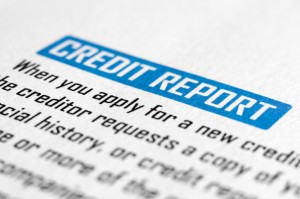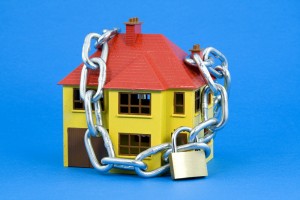When a lender is deciding whether to give you a loan, they need to know if you are going to pay it back. This isn’t just a matter of whether you can afford to make the payments. It’s also about whether you have shown a history of being responsible with credit and repaying debts on time. Elizabeth Henry reports.
 Lenders work on the assumption that the past predicts the future. If your past is full of poor money and credit decisions they will use this to predict your future behaviour.
Lenders work on the assumption that the past predicts the future. If your past is full of poor money and credit decisions they will use this to predict your future behaviour.
It’s easy to blame lenders for being stingy, but they aren’t just looking out for their profits. Following the credit crunch, financial authorities have introduced strict rules that lenders (especially big banks) must abide by when they offer mortgages – this is known as the Mortgage Market Review.
Lenders have to make sure you can pay the loan back – and that you actually plan to do so. Otherwise both you and the lender are put at risk.
Your credit report shows your credit history for the last six years, including credit applications, missed payments, and whether you have defaulted on accounts. It also includes publicly-available information such as your address and whether you are on the electoral roll. A lender uses this information to verify who you are and decide whether you can be relied on to repay what you owe.
What this means for your mortgage
 A poor credit history might not stop you getting a loan; but it will affect the terms of your mortgage. A lender will be less willing to take a big risk if your credit rating is poor, but instead of rejecting you outright they might ask for a bigger deposit or increase your interest rate.
A poor credit history might not stop you getting a loan; but it will affect the terms of your mortgage. A lender will be less willing to take a big risk if your credit rating is poor, but instead of rejecting you outright they might ask for a bigger deposit or increase your interest rate.
We spoke to Vic Jannels, spokesperson for All Types of Mortgages (AToM), a specialist mortgage broker and distributor. Jannels says today’s lenders are looking at two simple criteria: ability to pay and intent to pay.
“This is based on your history, your car loan payments and so on. Everything else comes off those two spokes. If you have a first-time buyer and their ‘intent to pay’ is poor most lenders will be very wary,” he says.
“First-time buyers almost invariably want to borrow 90 or 95 per cent, in which case the risk to the lender is quite high if it goes wrong. So either they say no or they put the interest rate relatively high – because they’re pricing for risk.”
Jannels says he asks customers a series of questions to decide if they might have issues – and if anything pops up then he’ll get them to apply for a credit report. This applies even to small adverse credit events. While you may see a missed car payment as insignificant, a lender could interpret this to mean you can’t handle a small loan so would struggle to pay back a big loan.
How’s my credit?
 There are three main credit report companies in the UK – Experian, Equifax and Callcredit.
There are three main credit report companies in the UK – Experian, Equifax and Callcredit.
James Jones from Experian says it’s important to go online and check your credit report is up to scratch before you start applying for a loan. Look at your credit report to see if there are any issues such as errors or suspicious transactions that could hurt your chances of a loan. At Experian you can access your report free for the first 30 days after which there’s a monthly fee.
If you’re planning on making an application in the future you should start preparing now by trying to appear like an ideal mortgage borrower, Jones says.
“Show you can make it through several months with a slight surplus. Don’t take out additional borrowing and try to demonstrate you can comfortably manage any outstanding credit commitments you have. A recent history of reducing any borrowing you have is likely to help your mortgage application too.”
Getting a mortgage with less-than-perfect credit
Right now big banks are being very cautious. Most tend to run your information through an automated computer system to produce a “credit score”, which varies from lender to lender.
That means you could be rejected by a computer without a human ever looking at your circumstances. But are you going to be haunted by your past forever? Not necessarily. Sometimes it pays to go through a smaller lender, Jannels says.
Building societies, for example, will usually check over your application manually. These mutuals have more of a small-town ethos focused on face-to-face interaction, so if you can explain why there are blips on your credit history you may be able to get a loan, particularly if you can show that it was a one-off – say a six-month hospitalisation where you made a real effort to pay back the money.
Take Darlington Building Society, which has always manually underwritten all mortgage applications. Chief executive Colin Fyfe says this helps staff fully understand the details of each case. Unlike big lenders, the society doesn’t use automated credit scoring.
“The society will however carry out detailed credit checks and these checks may identify a less than satisfactory credit history. It is expected that any issues would have been highlighted by the mortgage applicant,” Fyfe says.
Crucially, the society will often accept applications which have been rejected by other lenders, having first investigated any issues. And because they lend throughout England and Wales you don’t have to be a local to get a mortgage.
Credit repair mortgages
 Certain lenders specialise in lending to people who need to repair their credit, Jannels says. This is more common for second-time buyers who have more equity and can provide a bigger deposit (known as a lower loan-to-value ratio). If you’ve had negative arrears on a current mortgage but have since kept up with repayments, you may have an avenue to get credit.
Certain lenders specialise in lending to people who need to repair their credit, Jannels says. This is more common for second-time buyers who have more equity and can provide a bigger deposit (known as a lower loan-to-value ratio). If you’ve had negative arrears on a current mortgage but have since kept up with repayments, you may have an avenue to get credit.
One such lender is Magellan Homeloans, which will consider borrowers with one adverse credit event in the last 12 months as long as they have a good-sized deposit of around 25 per cent of the property’s value. If you decide to remortgage at the end of a one- or two-year fixed term with a specialist lender like Magellan, the next lender will note that you’ve kept up your repayments, and will view you in a better light – so it’s a virtuous circle.
Jannels says some lenders will also lend to people with a small deposit, and “some fairly gritty adverse credit on file”, as long as they have a very good reason, such as divorce or serious illness. Your best chance is to talk to an adviser, – it’s their job to know the market and find a lender who will work with you.
Remember that credit repair loans are more expensive than standard loans. Make sure to check the terms and conditions, and don’t get locked into a long-term credit-repair contract – the idea is to spend a couple of years on a higher-interest mortgage and repair your credit before moving to a standard mortgage. It’s also crucial to work out a budget and see if you can afford it before signing on the dotted line. The last thing you want is to miss payments and make your credit history worse.
Repossessions and bankruptcy
 While property repossessions aren’t recorded on your credit report, the mortgage provider is likely to have registered a default, which will still show up, Experian’s James Jones explains.
While property repossessions aren’t recorded on your credit report, the mortgage provider is likely to have registered a default, which will still show up, Experian’s James Jones explains.
“Bankruptcy, any other insolvency and defaulted credit accounts stay on your credit report for six years and can have a significant impact on any credit applications you make during that time.”
Vic Jannels says anyone who has had their house repossessed in the last 10 years will usually be rejected, although one or two lenders will work to a shorter timeframe. Remember that the loan they offer will be more expensive.
Even after bankruptcy disappears from your credit report, your bankruptcy is still on record and lenders will find out about it eventually. Whether they take it into account is another story. Discuss this with a broker if you’re concerned it will affect your chances of getting a loan.
What about other credit repair services?
Plenty of companies claim they can fix your credit – for a fee. The general consensus is that most of these are a sham and prey on people’s desperation. Repairing your credit history is not a quick process, especially if you have made poor decisions in the past. No company can remove a bankruptcy from your history; all they can do is fix errors or take note of fraudulent activity. But you can do this yourself by contacting the credit agency without using a middleman. In short: don’t get sucked in.
I have perfect credit – why can’t I get a loan?
 Many young people have never taken out credit, which oddly enough can actually be a bad thing when it comes to getting a mortgage – even though their credit report looks pristine. You may know that you’re good with money, but as far as the lender is concerned you are an “unknown quantity”, Jones says.
Many young people have never taken out credit, which oddly enough can actually be a bad thing when it comes to getting a mortgage – even though their credit report looks pristine. You may know that you’re good with money, but as far as the lender is concerned you are an “unknown quantity”, Jones says.
One way of fixing this is to take out credit to build up a positive credit history.
Jones explains: “Putting something like your monthly petrol on your credit card and paying it off in full every month will build positive data on your credit report and put you in a much stronger position to make any future applications.
“More creditors are now sharing information with credit reference agencies, such as energy and water firms, so these days there are lots more opportunities to build up a positive track record on your credit report.”
Jannels agrees, but says he’s very wary of advising an 18-year-old to go out and get a credit card. There may be other ways to improve your chances with lenders, including scraping together a decent deposit – perhaps with help from relatives – which lowers the lender’s risk. Even better, if you can show through your account history that you have saved a big deposit by yourself, then the lender has proof that you can budget and make responsible decisions with your own money.
The answer no one wants to hear
If your credit history shows a cavalier attitude to debt, then lenders may be quite wise not to take you on, Vic Jannels says. “If you have a bad credit file and we say you’re not in a position to get a mortgage, we suggest you go away and resolve those issues to the best of your ability.”
[box style=”2″]
[tabs]
[tab title=”Case study”]
There is life after bad credit
Carli Burke went bankrupt in 2007 after a divorce. Even though the couple had never defaulted on their debts, they were spending most of their money on repayments and “not really living”, Carli says. Even after selling the house, she knew bankruptcy was the best move.
But it would be a long journey back to financial health, especially now with the pressures of being a single mum. So Carli went on a mission to get a better credit history and improve her future opportunities.
First she signed up to Experian’s CreditExpert service. Its indicative scoring system gave her just 600 out of 999. But she worked her way back, taking out a mobile phone contract in 2010 which helped rebuild her score. The bankruptcy came off her record last year and she acquired a credit card specifically for people with bad credit.
“Whilst it has a high interest rate I’ve never missed payments and am now in a position to get other, lower rate interest credit cards,” she says. “I’ve never been declined and therefore consider the service a success.”
She’s got her score as high as 975, and amazingly she and a friend who is also a single mum are now planning to combine their resources and buy a house together. Now aged 40, Carli admits she thought she would never get credit again and certainly not a mortgage.
“It just shows, there is life after bankruptcy,” she says. “It’s not all negative and there are options.”
[/tab]
[/tabs]
[/box]





I want to get a mortgage as my credit is 994 I been refused by the bank at the moment I’m in a private place I pay 550 a month I want to keep paying that amount the house I want to buy a brand new house it is 135000 I want to borrow 130000 please email me
Hello Angela,
I can’t help you with your dilema. I would suggest you find a mortgage advisor.
Thank you for your comment.
I want a mortgage for 180.000 i currently have a mortgage but also have debt between myself and partner. My house now is valued at between 160.000 and 165.000. 2 bed house. im now in need of a 3 bed house as of the age of my kids . I currently owe 112.000 on the house. What I want to know is would any one lend me what I’m looking for ? PLEASE EMAIL ME
THANK YOU!
Hello Richard,
Thank you for your comment.
I think you should arrange a consultation with your bank or a mortgage advisor.
They will let you know in detail about your situation and what next step would be.
Hi, I have a secured loan that was listed as a 2nd mortgage on my credit report,
Unfortunately I have now defaulted, and this is showing on my credit report, but will this not show after 6 years ? Or my question is – as its down as a 2nd mortgage ( even though it was a loan ) does this show on my report as defaulted until it is paid off in full ? And will all defaults not be shown after 6 years from the initial default date ? thanks . J.
My credit score is only 490, I’m 48 and only just secured a permanent job. I’ve never missed my rent, council tax or utilities which doesn’t seem to matter. I really wan to buy a small property for less than £100,000 but will I ever get a mortgage. I will have £10,000 deposit and would like my next move to be my last one hopefully to my own place, but is there any point in even trying. I’m scared of being ripped off.
Im after a property worth £150,000 and have a £90,000 deposit. I have a poor credit history. With such a large deposit, will i have a problam getting the mortgage?
There are specialist lenders who may be able to help. Speak to a broker who specialises in more complex situations.